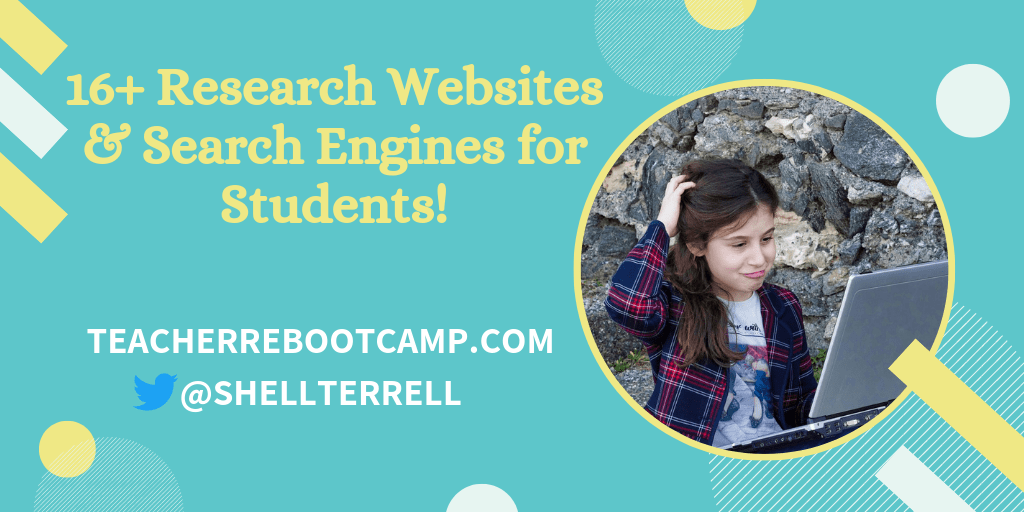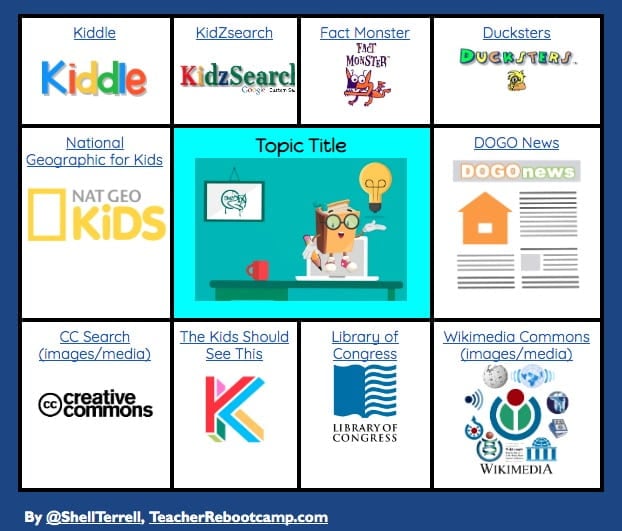“Television didn’t transform education. Neither will the internet. But it will be another tool for teachers to use in their effort to reach students in the classroom.” – John Palfrey
To learn more about a topic or find the answer students will often Google it! Search engines don’t always show the most factual, relevant, or unbiased results first. Sometimes search engines can lead students to inappropriate websites. Below is a research choice menu for you to use and edit as you like that I use with my students! I have also listed useful research, news, and digital media websites to add to the research choice menu depending on what you are exploring. Students also need to learn how to be skilled searchers, which is why I also added places with free lesson plans and resources to teach students develop search skills.
?Discover more ways to integrate technology effectively by taking one of my fully accredited online courses or get one of my books!
Free Research Choice Menu Board
Click the image below to make a copy of the choice menu board template. Edit as you like!
Activity Idea
One of the activities in my book, Hacking Digital Learning Strategies: Ways to Launch EdTech Missions is to get students to do a quick 2 minute search about the topic. Students write down any 3 ideas they find then build on that knowledge by trying to add 3 different ideas by other students. Then get students to rate each idea as a fact, opinion, or gossip. Encourage them to guess. Then give them another 2 to 5 minutes to do fact checks to see which ideas are facts and which might be biased or need more research. Students can add the facts to a Linoit/Padlet sticky note board for all to learn from or on a Bubbl.us cognitive map.
16 Recommended Search Engines and Research Websites
- Fact Monster is a search engine that features Frank, the friendly monster, who helps with facts, homework, trivia, games, and quizzes.
- DOGO News is a website and iOS/Android app for K to 12 students to find current events and research based articles. Each article gives an easy citation for students to copy and include as well as images and videos.
- The Kids Should See This is probably the most engaging search results for students who will find viral gifs and videos about their topics.
- Science Journal for Kids has a pdf with assessment questions, videos, and an area for further research by asking a scientist.
- The Creative Commons Search Engine and WikiMedia Commons are two wonderful search engines to find images, videos, and other multimedia free to use in projects or presentations as long as the author is attributed appropriately.
- Kiddle is a safe visual search engine for kids.
- KidzSearch is a Google filtered search which features KidzTube videos and educational games on the front page.
- Ducksters is a search engine with different categories for a general subject search like history, science, geography, and more.
- NatGeoKids is a website with games, trivia, and articles about animals and the world. My students love this website. We also like learning more about countries with the interactive world map.
- Science News for Students provides vocabulary lists and readability scores for each article. This is for grades 6 to 12.
- KidsClick is a web search site designed for kids by librarians with kid-friendly results!
- Kid Rex is another kid-friendly search engine with a simple colorful interface.
- Safe Search Kids is powered by Google to deliver filtered search results.
- Kid’s Search is a safe and fun way to search the Internet.
- Choosito is a student search engine and digital library. Sign up for a free trial.
- The Library of Congress provides archived newspapers, patents, historical documents, and images for students to search and discover information about a topic.
Equip Them to be Skilled Searchers
- Provide students with tips on how to conduct better searches on popular search engines.
- Get students to distinguish from the entries that are paid ads and quality results.
- Show students how to change the search engine’s settings to discover more credible and relevant results. You can change the year, type of resource, and more!
- Microsoft features short videos that introduce students to the different steps of conducting a good search.
- For more in depth lesson plans check out the Google Search Education website. These search literacy lesson plans are categorized into activities for beginner, intermediate and advanced students.
- The Be Internet Awesome curriculum by Google has different activities and lessons on how to spot fake news.
- Common Sense Education has a free K to 12 curriculum that covers information literacy and digital citizenship.
Challenge: Challenge students to use these safe search engines and research websites to conduct research about a topic or project!
Subscribe for FREE to receive regular updates!
?Get your copy of Hacking Digital Learning or The 30 Goals Challenge or take a fully accredited online course for graduate credit (Online Learning Best Practices, Connected Educators or TESOL Methodologies)!









